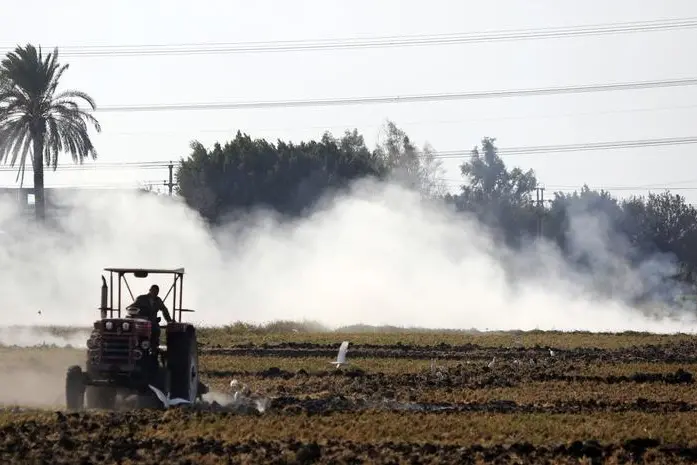PHOTO
DUBAI - Egypt's agriculture ministry has officially brought its policy on common grain fungus ergot into line with other government agencies, in a move traders hope will end long-running confusion over import requirements at the world's biggest wheat buyer.
"We want to reassure our suppliers," Hamed Abdel Dayem, spokesman for the ministry, told Reuters on Thursday, confirming its new decree.
Reuters reported late on Wednesday the new decree, dated Dec. 12, stated that any wheat with an ergot content above 0.05 percent would be rejected, while shipments infected below that level would be treated and accepted.
This fixes a discrepancy in regulations governing the work of the agricultural quarantine agency, which falls under the agriculture ministry.
Confusion over Egypt's ergot policy wreaked havoc on global grain markets in 2016 until a decree by the prime minister put an end to the crisis by enforcing the common international 0.05 percent tolerance level over the stricter zero tolerance policy practiced by agricultural inspectors.
The root of the problem was a 2001 regulation used by the country's agriculture quarantine inspectors which stipulated, until this week's decree, a zero tolerance for ergot.
That regulation had remained unchanged despite the prime minister's decree issued more than a year ago.
Other Egyptian officials and bodies followed a different specification issued in 2010 by the Egyptian Organization for Standardization and Quality allowing trace levels of up to 0.05 percent, the common worldwide standard and the one stipulated by Egypt's grain-importing body, the General Authority for Supply Commodities (GASC).
The agriculture ministry's latest decree changes that.
"This means officially by the law, there should be no more ergot issues," a Cairo-based trader said.
In November, Egypt filed a legal complaint against a court ruling issued earlier in the month that effectively reinstated zero tolerance for the fungus.
GASC has continued to retain its 0.05 percent tolerance level in shipments despite the court ruling.
(Reporting by Maha El Dahan; Editing by Mark Potter) ((Maha.Dahan@thomsonreuters.com; + 9712 4082101; Reuters Messaging: maha.dahan.thomsonreuters.com@reuters.net))
"We want to reassure our suppliers," Hamed Abdel Dayem, spokesman for the ministry, told Reuters on Thursday, confirming its new decree.
Reuters reported late on Wednesday the new decree, dated Dec. 12, stated that any wheat with an ergot content above 0.05 percent would be rejected, while shipments infected below that level would be treated and accepted.
This fixes a discrepancy in regulations governing the work of the agricultural quarantine agency, which falls under the agriculture ministry.
Confusion over Egypt's ergot policy wreaked havoc on global grain markets in 2016 until a decree by the prime minister put an end to the crisis by enforcing the common international 0.05 percent tolerance level over the stricter zero tolerance policy practiced by agricultural inspectors.
The root of the problem was a 2001 regulation used by the country's agriculture quarantine inspectors which stipulated, until this week's decree, a zero tolerance for ergot.
That regulation had remained unchanged despite the prime minister's decree issued more than a year ago.
Other Egyptian officials and bodies followed a different specification issued in 2010 by the Egyptian Organization for Standardization and Quality allowing trace levels of up to 0.05 percent, the common worldwide standard and the one stipulated by Egypt's grain-importing body, the General Authority for Supply Commodities (GASC).
The agriculture ministry's latest decree changes that.
"This means officially by the law, there should be no more ergot issues," a Cairo-based trader said.
In November, Egypt filed a legal complaint against a court ruling issued earlier in the month that effectively reinstated zero tolerance for the fungus.
GASC has continued to retain its 0.05 percent tolerance level in shipments despite the court ruling.
(Reporting by Maha El Dahan; Editing by Mark Potter) ((Maha.Dahan@thomsonreuters.com; + 9712 4082101; Reuters Messaging: maha.dahan.thomsonreuters.com@reuters.net))





















